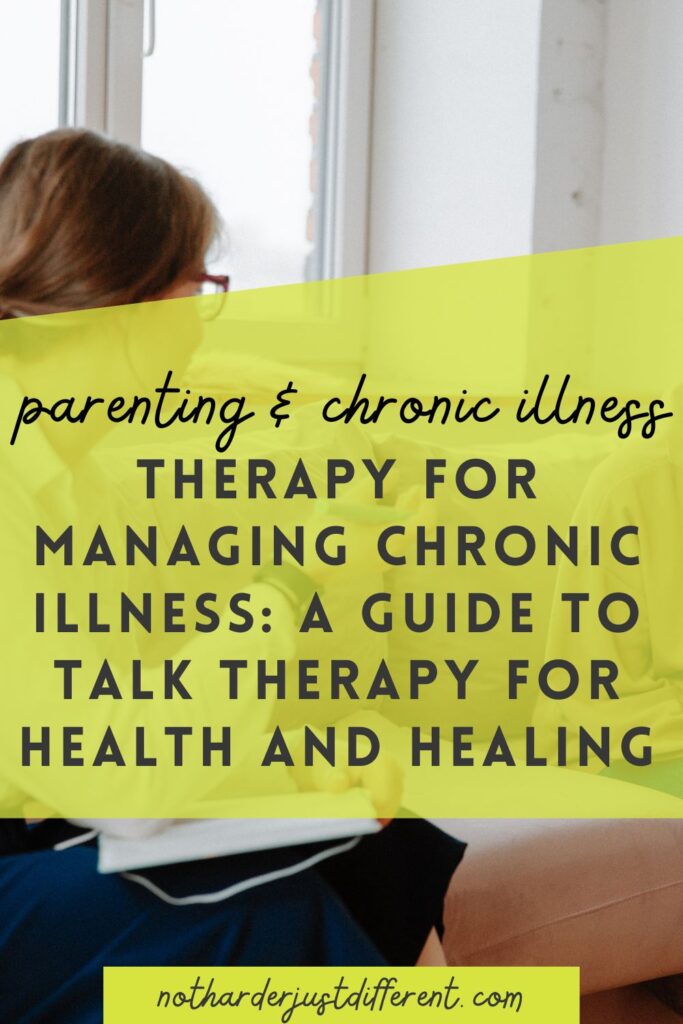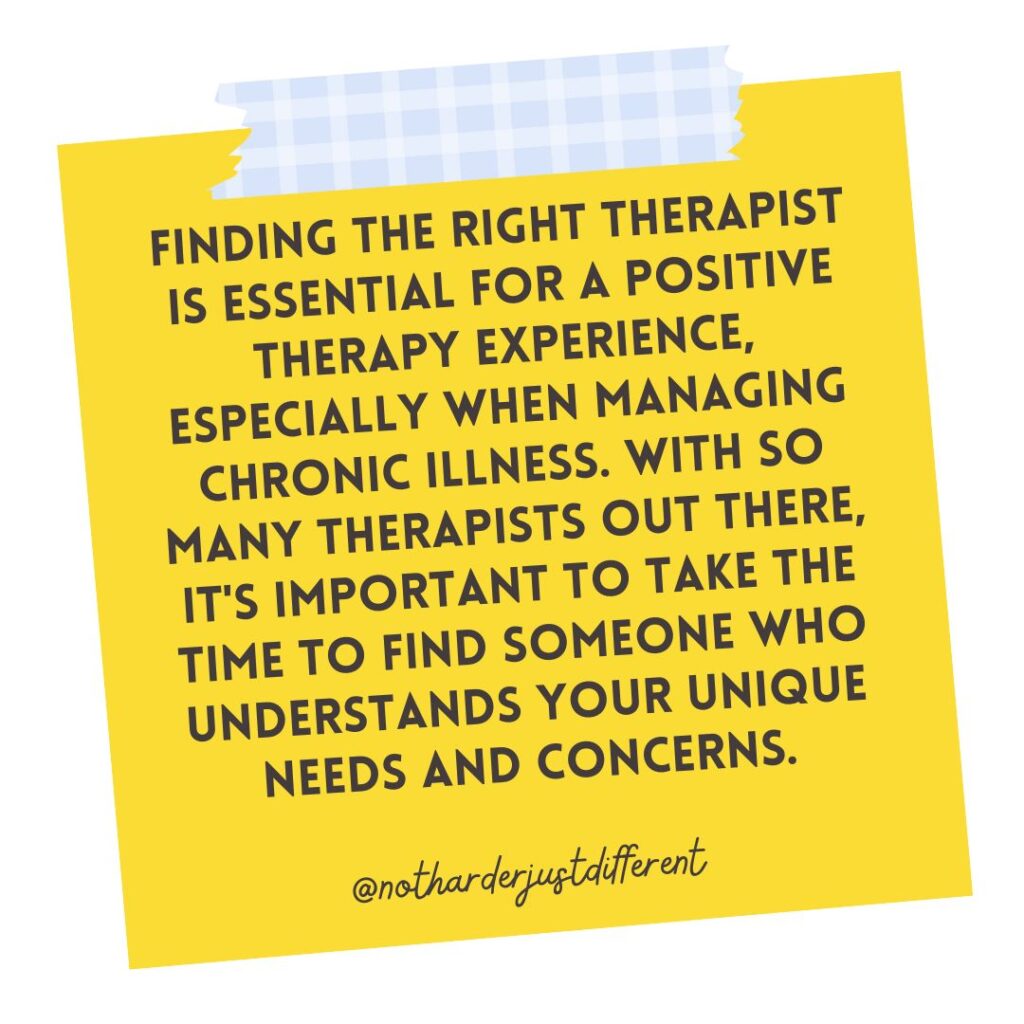Disclaimer: As a future Licensed Clinical Social Worker (LCSW) currently pursuing my master’s degree, I am passionate about sharing insights and information related to parenting, autism and homeschooling based on my personal experiences and research. However, the content shared on this blog is not intended to substitute professional advice, diagnosis, or treatment. Parenting is a deeply personal journey, and while I strive to provide valuable insights, every family and situation is unique. Readers are encouraged to consult with qualified professionals for personalized guidance tailored to their specific needs and circumstances.
Let’s have a heart-to-heart about therapy for managing chronic illness. You know, sometimes dealing with the ups and downs of chronic illness can feel like a rollercoaster ride, right? Well, as a future Licensed Clinical Social Worker (LCSW) and a huge advocate of therapy, I can tell you firsthand that therapy—specifically talk therapy with a therapist—can be like your safety harness, helping you navigate the twists and turns with a little more ease.
Living with chronic illness isn’t just about managing physical symptoms—it’s also about navigating the emotional rollercoaster that comes with it. That’s where therapy comes in! Talk therapy provides a safe space for you to explore your thoughts, feelings, and experiences related to your chronic illness. Whether you’re struggling with anxiety, depression, or simply feeling overwhelmed by the challenges of living with a chronic condition, as a future LCSW, I firmly believe that a therapist can offer support, guidance, and practical coping strategies to help you feel more empowered and in control of your health.

Understanding Talk Therapy with Chronic Illness
Let’s delve deeper into the world of talk therapy—it’s more than just chatting with a therapist. Talk therapy, also known as psychotherapy or counseling, is a collaborative process between you and a trained therapist. It provides a safe and confidential space for you to explore your thoughts, emotions, and experiences in a supportive and nonjudgmental environment. Unlike casual conversations with friends or family, talk therapy is guided by evidence-based techniques and therapeutic approaches tailored to address your unique needs and concerns.
In talk therapy sessions, your therapist will actively listen to you, offering empathy, validation, and perspective without judgment. They’ll help you explore the underlying causes of your thoughts and feelings, identify unhelpful patterns or beliefs, and develop healthier coping strategies. Depending on your goals and preferences, therapy sessions may focus on specific issues related to your chronic illness, such as managing symptoms, navigating healthcare decisions, or addressing emotional challenges. Through open and honest dialogue, you and your therapist will work collaboratively to uncover insights, foster self-awareness, and promote positive change in your life.
As a future Licensed Clinical Social Worker (LCSW) and a passionate advocate of therapy, I believe in the transformative power of talk therapy to promote healing, growth, and resilience. Whether you’re facing challenges related to your chronic illness or struggling with other life stressors, therapy offers a safe and supportive space for you to explore your inner world, gain clarity, and build the skills needed to live a fulfilling and meaningful life. So, if you’re ready to embark on a journey of self-discovery and personal growth, know that therapy can be a valuable tool on your path to health and healing.
Benefits of Talk Therapy for Chronic Illness
First and foremost, talk therapy provides a safe and nonjudgmental space for you to process their emotions and experiences related to your chronic condition. Managing a chronic illness can evoke a wide range of emotions, from frustration and fear to grief and uncertainty. Talk therapy offers a supportive environment where you can express these feelings openly and receive validation and empathy from your therapist. By acknowledging and exploring your emotions, you can gain a deeper understanding of how your chronic illness impacts your mental and emotional health.
Also, talk therapy can help you develop practical coping strategies to manage the challenges associated with chronic illness. Your therapist can teach you relaxation techniques, stress management strategies, and problem-solving skills to help you navigate difficult situations and reduce emotional distress. Through cognitive-behavioral techniques, such as reframing negative thoughts or challenging unhelpful beliefs, you can learn to cultivate resilience and adaptability in the face of adversity. By building a toolkit of coping skills, you can enhance your ability to cope with the ups and downs of living with a chronic condition and improve your overall quality of life.
Talk therapy can also help facilitate better communication and collaboration between you and your healthcare providers. Your therapist can help you articulate your needs, concerns, and treatment preferences to your healthcare team, empowering you to take an active role in your healthcare decisions. By improving communication with your healthcare providers, you can ensure that your treatment plan aligns with your goals and values, leading to more effective and personalized care. Additionally, therapy can provide a valuable source of support and encouragement as you navigate the complex healthcare system, helping you advocate for yourself and access the resources you need to thrive despite your chronic illness.

Finding the Right Therapist
Finding the right therapist is essential for a positive therapy experience, especially when managing chronic illness. With so many therapists out there, it’s important to take the time to find someone who understands your unique needs and concerns. Here are some tips to help you find the perfect therapist for you:
- Consider Specialization: Look for therapists who specialize in working with individuals with chronic illness or health-related concerns. These therapists will have experience and expertise in addressing the emotional and psychological aspects of living with a chronic condition. They can offer valuable insights, support, and practical strategies to help you cope with the challenges of your illness.
- Check Credentials: Ensure that the therapist you choose is licensed and accredited to practice therapy in your state or country. Look for credentials such as Licensed Clinical Social Worker (LCSW), Licensed Professional Counselor (LPC), Psychologist (Ph.D. or Psy.D.), or Licensed Marriage and Family Therapist (LMFT). These credentials indicate that the therapist has met rigorous education and training requirements and adheres to professional ethical standards.
- Consider Compatibility: Therapy is a collaborative process, so it’s essential to find a therapist with whom you feel comfortable and connected. Consider factors such as personality, communication style, and therapeutic approach when choosing a therapist. Trust your instincts and choose someone who makes you feel heard, understood, and supported.
- Explore Therapy Modalities: Different therapists may utilize different therapy modalities or approaches in their practice. Research various therapy modalities, such as cognitive-behavioral therapy (CBT), mindfulness-based therapy, or psychodynamic therapy, and consider which approach aligns with your preferences and goals. Some therapists may offer a blend of different modalities to tailor treatment to your specific needs.
- Consider Practical Factors: Finally, consider practical factors such as location, availability, and cost when choosing a therapist. Decide whether you prefer in-person therapy or online counseling, and consider the therapist’s office hours and scheduling flexibility. Additionally, inquire about the therapist’s fees and whether they accept insurance or offer sliding scale fees based on income. By considering these practical factors, you can ensure that therapy is accessible and convenient for you.
Types of Talk Therapy Approaches
When it comes to talk therapy, there are various approaches and modalities that therapists may use to help individuals manage chronic illness and improve their overall well-being. Let’s explore some of the most common types of talk therapy approaches:
- Cognitive-Behavioral Therapy (CBT): CBT is a widely used therapeutic approach that focuses on identifying and changing negative thought patterns and behaviors. In the context of chronic illness, CBT can help individuals challenge unhelpful beliefs about their illness, cope with symptoms more effectively, and develop practical strategies for managing stress and anxiety. By teaching individuals to reframe negative thoughts and adopt healthier coping mechanisms, CBT can empower them to take control of their mental and emotional health despite the challenges of their illness.
- Mindfulness-Based Therapy: Mindfulness-based therapy incorporates mindfulness practices such as meditation, deep breathing, and body awareness into the therapeutic process. This approach encourages individuals to cultivate present-moment awareness and nonjudgmental acceptance of their thoughts, feelings, and bodily sensations. In the context of chronic illness, mindfulness-based therapy can help individuals reduce stress, enhance resilience, and improve overall well-being by fostering a greater sense of calm, acceptance, and self-compassion.
- Psychodynamic Therapy: Psychodynamic therapy focuses on exploring unconscious patterns and conflicts that may contribute to emotional distress and interpersonal difficulties. In therapy sessions, individuals may explore their past experiences, relationships, and early childhood experiences to gain insight into their current thoughts, feelings, and behaviors. By uncovering underlying patterns and gaining a deeper understanding of themselves, individuals can work through unresolved issues, develop healthier relationships, and achieve greater self-awareness and personal growth.
- Interpersonal Therapy (IPT): IPT focuses on improving interpersonal relationships and communication skills to alleviate symptoms of depression and anxiety. In the context of chronic illness, IPT can help individuals address relationship challenges, role transitions, and social isolation that may arise as a result of their illness. By focusing on improving communication, problem-solving, and conflict resolution skills, IPT can help individuals build stronger support networks, enhance social functioning, and improve overall quality of life.
- Acceptance and Commitment Therapy (ACT): ACT is a mindfulness-based therapeutic approach that focuses on accepting difficult thoughts and feelings while committing to actions aligned with one’s values and goals. In the context of chronic illness, ACT can help individuals cultivate acceptance of their illness-related challenges and limitations while identifying meaningful activities and goals that bring joy and fulfillment. By learning to live in accordance with their values despite the presence of illness, individuals can enhance their psychological flexibility, resilience, and overall well-being.
Each of these talk therapy approaches offers unique techniques and strategies to help individuals cope with the emotional and psychological aspects of chronic illness. By working with a therapist who specializes in one or more of these approaches, individuals can receive personalized support and guidance tailored to their specific needs and goals. Whether you’re struggling with anxiety, depression, or simply feeling overwhelmed by the challenges of living with a chronic condition, talk therapy can provide a valuable source of support, empowerment, and healing on your journey to health and well-being.
Incorporating Therapy into Your Chronic Illness Management Plan
Managing chronic illness is a multifaceted endeavor that requires a comprehensive approach to address both physical and emotional needs. Incorporating therapy into your chronic illness management plan can be a valuable component of your overall care regimen. Here are some practical strategies for integrating therapy into your routine:
- Scheduling Therapy Sessions: Start by scheduling regular therapy sessions with a qualified therapist who specializes in working with individuals with chronic illness. Consider factors such as frequency of sessions, duration, and whether you prefer in-person therapy or online counseling. Work with your therapist to establish a consistent schedule that fits into your routine and allows for continuity of care.
- Setting Goals: Collaborate with your therapist to set specific, achievable goals for therapy that align with your needs and priorities. Whether your goals involve reducing anxiety, improving coping skills, or enhancing self-care practices, clearly defining your objectives can provide direction and focus for your therapy sessions. Regularly revisit and revise your goals as needed to ensure that therapy remains relevant and beneficial to your overall well-being.
- Tracking Progress: Keep track of your progress in therapy by monitoring changes in your thoughts, feelings, and behaviors over time. Consider keeping a journal or diary to record your experiences between therapy sessions, noting any insights, challenges, or breakthroughs you encounter. Tracking your progress can help you identify patterns, celebrate achievements, and communicate effectively with your therapist about your ongoing needs and concerns.
- Integrating Therapy with Other Healthcare Services: Coordinate therapy with other aspects of your chronic illness management plan, such as medical treatments, medication management, and lifestyle modifications. Communicate openly with your healthcare providers about your participation in therapy and how it complements your overall care regimen. Share insights and strategies from therapy sessions with your healthcare team to ensure that everyone is working together to support your health and well-being.
- Practicing Self-Care: Incorporate self-care practices into your daily routine to complement the benefits of therapy and promote overall well-being. Engage in activities that nourish your mind, body, and spirit, such as exercise, meditation, creative expression, and spending time with loved ones. Prioritize self-care activities that align with your values and preferences, and make time for relaxation, rejuvenation, and self-reflection as needed.
Therapy provides a supportive and empowering space for you to explore your thoughts, feelings, and experiences related to your illness, develop practical coping strategies, and cultivate resilience in the face of adversity. With the guidance and support of a qualified therapist, you can navigate the emotional and psychological aspects of chronic illness with greater ease and confidence, empowering you to live a fulfilling and meaningful life despite the challenges you may face.

